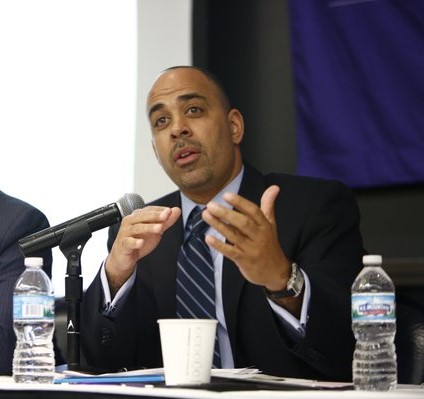 As I watched Attorney General Jeff Sessions announce the termination of DACA, I was reminded how President Donald Trump had duped Democrats into actually supporting Sessions and arguing that he should not be removed as the head of the Justice Department. Sessions’ announcement meant the end of protections provided to nearly one million Dreamers under President Barack Obama’s Deferred Action for Childhood Arrivals, or DACA.
As I watched Attorney General Jeff Sessions announce the termination of DACA, I was reminded how President Donald Trump had duped Democrats into actually supporting Sessions and arguing that he should not be removed as the head of the Justice Department. Sessions’ announcement meant the end of protections provided to nearly one million Dreamers under President Barack Obama’s Deferred Action for Childhood Arrivals, or DACA.
A few months before the DACA press conference, when Sessions erroneously claimed that children brought to the United States by their parents were taking jobs away from Americans, Trump publicly criticized Sessions and signaled that he might be one of several administration officials on the chopping block. But fearing that Sessions’ ouster might lead to the firing of special counsel Robert Mueller, who is investigating Trump’s ties to Russia, Democrats caved and called for the attorney general to keep his job. Just a few months earlier, in his confirmation hearings, these same Democrats were trying to stop Sessions from becoming the nation’s top cop while reading the words of Coretta Scott King, Dr. Martin Luther King Jr.’s widow, warning that Session was a racist.
There has been debate about whether Trump is crazy or crazy like a fox. Though clearly showing signs of mental instability at times, Trump seemed to outfox Democrats with this move. Democratic and Republican congressmen called on Trump to keep his attorney general in place, and the president, who usually shuns such pressure, either complied or enacted his ploy to deceive the Democrats. Either way, Sessions remains, more secure than ever.
Sessions leads the Department of Justice, which encompasses the Office of Juvenile Justice and Delinquency Prevention (OJJDP). The OJJDP distributes hundreds of millions of dollars to states for prevention, diversion and rehabilitation programs, including those that aim to reduce racial and ethnic disparities. Yet his regressive policy agenda may dismantle the very reforms OJJDP has sought to achieve.
While the attorney general for Alabama, Sessions suggested that youth in the juvenile justice system be sent to “work camps” and argued for more funds to be spent on expanding youth incarceration. When he was on a youth violence subcommittee in the U.S. Senate, Sessions doubled down on his out-of-touch stance on juvenile justice, opposing prevention programs. In 2009, he also put forth an amendment to the reauthorization of juvenile justice funding to expand the number of children being charged and incarcerated as adults in the federal system.
Early on in Trump’s presidency, Sessions announced that the Department of Justice would no longer pursue federal orders to reform police agencies that abuse their powers and have a pattern and practice of discrimination. Then while speaking to officers in New York, Trump encouraged police to violate the Constitution by intentionally roughing up suspects.
Sessions has also rescinded Obama administration policy aimed at reducing the number of people imprisoned for drug crimes. The Justice Department’s “Smart on Crime” initiative implemented by former Attorney General Eric Holder encouraged federal prosecutors to not go after long sentences for those charged with nonviolent drug offenses, a policy that has become a universally accepted, nonpartisan issue.
Sessions is instead looking to revive the war on drugs that led America to excessive levels of mass incarceration. After several decades of over-reliance on ineffective, harmful and excessively expensive incarceration, the United States has finally seen a significant reduction in youth detention rates and the beginning of a decline in the number of adults in prison.
Jeff Sessions would like to take us back to the dark ages, and Trump duped Democrats into supporting him.
David Muhammad is the executive director of the National Institute for Criminal Justice Reform. He is the former chief probation officer of Alameda County in California and the former deputy commission of probation in New York City.